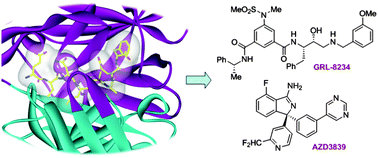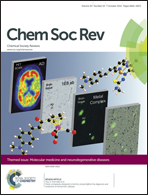BACE1 (β-secretase) inhibitors for the treatment of Alzheimer's disease
Abstract
BACE1 (β-secretase, memapsin 2, Asp2) has emerged as a promising target for the treatment of Alzheimer's disease. BACE1 is an aspartic protease which functions in the first step of the pathway leading to the production and deposition of amyloid-β peptide (Aβ). Its gene deletion showed only mild phenotypes. BACE1 inhibition has direct implications in the Alzheimer's disease pathology without largely affecting viability. However, inhibiting BACE1 selectively in vivo has presented many challenges to medicinal chemists. Since its identification in 2000, inhibitors covering many different structural classes have been designed and developed. These inhibitors can be largely classified as either peptidomimetic or non-peptidic inhibitors. Progress in these fields resulted in inhibitors that contain many targeted drug-like characteristics. In this review, we describe structure-based design strategies and evolution of a wide range of BACE1 inhibitors including compounds that have been shown to reduce brain Aβ, rescue the cognitive decline in transgenic AD mice and inhibitor drug candidates that are currently in clinical trials.

- This article is part of the themed collection: Molecular Medicine and Neurodegenerative Diseases

 Please wait while we load your content...
Please wait while we load your content...